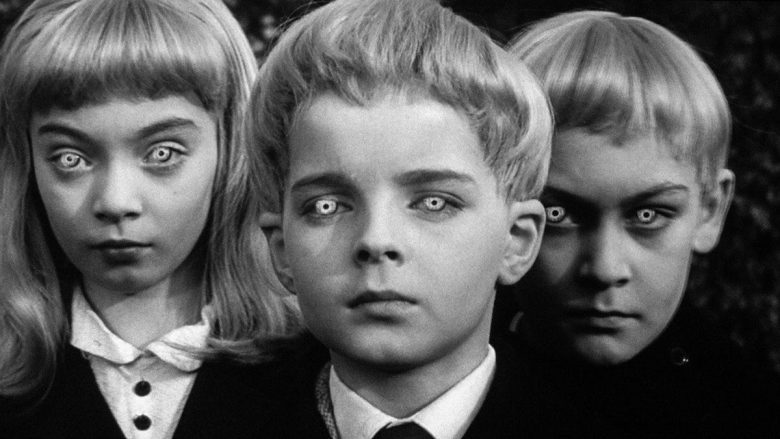CHILDREN OF THE DAMNED :
JOHN WYNDHAM, THE MIDWICH LEGACY, AND JEFFERSON AIRPLANE
by Tom Lavagnino
Every resident of the little English town of Midwich is suddenly rendered unconscious. Outside investigators determine that a mysterious “force field” has descended upon the burgh, knocking everybody out and neutralizing all who dare penetrate the town’s invisible barrier. A pilot flies reconnaissance over the area; he, too, is blacked out by the force — and dies, tragically, as his plane crashes and explodes on the edge of town.
That pilot is the lone fatality in the opening reel of VILLAGE OF THE DAMNED –- the gloriously creepy 1960 film that reps the first cinematic adaptation of British writer John Wyndham’s work. And when those misbegotten residents of Midwich collectively awaken, several hours after their unconsciousness episode, having no memory or understanding of what befell them, their only question is: What the hell happened?
This narrative question is signature Wyndham. A spiritual protégé of Jules Verne and H.G. Wells, his sensibility was colored, to a large extent, by his volatile experiences during WWII. Wyndham’s pre-war literary efforts, while numerous and often pseudonymous, trafficked almost exclusively in pulps (he wrote countless detective stories and dime-store novels, along with boilerplate sci-fi, throughout the late 1920’s and 1930’s); the challenges emboldened by a life amidst the Blitz proved to be the seed causing Wyndham’s outlook to thematically blossom.
And the blossoming was literal. His hugely popular 1951 novel THE DAY OF THE TRIFFIDS (filmed as INVASION OF THE TRIFFIDS a dozen years later) featured a botanical threat to humanity in the form of malevolent, interstellar-weaned, Venus-Fly-trap-like plants; Wyndham’s follow-up, the apocalyptic THE KRAKEN WAKES — and its dystopian cousin, 1955’s THE CHRYSALIDS (titled RE-BIRTH in the USA) — further honed his imaginative-yet-wholly-grounded worldview. THE CHRYSALIDS was a direct influence not only on nuclear-holocaust best-sellers of the period (see Nevil Shute’s ON THE BEACH, published two years later) but also, surprisingly, on the lyrics to Jefferson Airplane’s 1968 tune “Crown Of Creation” (which utilized, with Wyndham’s permission, the lyric “but life is change, that is how it differs from rocks, change is its very nature” — lines lifted directly from the novel’s text).
Life is change. That dynamic is never more pronounced than in Wyndham’s 1957 novel THE MIDWICH CUCKOOS. No less a literary giant than Margaret Atwood (whose THE HANDMAID’S TALE is directly influenced by Wyndham) cites the book as “John Wyndham’s chef d’oeuvre”; its clear-eyed, subversive themes were catnip for the producers of VILLAGE OF THE DAMNED.
In the aftermath of Midwich’s awakening, its citizens are confounded about their “blackout period” but seemingly unharmed. Sixty days later, a dozen town women realize that they’re unaccountably pregnant; short months later they give birth to preemie babies who, while seemingly human, are physically and intellectually advanced. Bewilderment heightens. Anger gets stoked. Family dogs snarl at the newborns. Fathers gather at the local pub, drowning their sorrows at the impossibility of their having sired the children; “I hope that none of them lives,” laments one godforsaken Daddy.
The Midwich children “grow” at a hyper-kinetic rate, and their three distinct characteristics (strange eyes, physiologically-odd hair follicles, and unusual fingernails) get trumped by a much more dynamic (and problematic) proclivity: “if you demonstrate something to one of them, they all know it.”
This “hive mind” notion, coupled with a marked proficiency in telekinesis –- the twelve children are able to read the thoughts of all humans in their midst, sussing out questions before their asking (and identifying threats before implementation) –- is the one-two punch marking the “children of Midwich” as unique and unprecedented.
But the perennial sci-fi question: Are they dangerous?
The jury’s out as the dozen blithely ignore the concerns of Midwich’s townspeople (prompting another Jefferson Airplane/John Wyndham lyric: “in loyalty to our kind / they cannot tolerate our minds”). But as the kids’ influence grows — and when they collectively “eye” a threatening local man, causing him to suicidally crash his car into a wall (“BEWARE THE STARE” being a pivotal marketing phrase for the movie) — municipal tensions rise to a fever pitch. Heroic town leader Gordon Zellaby (George Sanders), “father” to young David (the “leader” of the children), argues on the kids’ behalf (“who’s to say these children aren’t the answer to the world’s problems?”), but he’s overruled by the town’s powers-that-be — whose own “hive mind” concludes that the children must all be eliminated. “What cannot be understood must be put away.”
Recognizing the inevitable, Gordon plots to sacrifice himself by venturing into the kids’ home base (a local church) with a makeshift bomb. But he knows the children can read his thoughts; how does he not “tip them off” to his agenda as he walks through the door? Gordon’s solution: Forming a picture in his mind, with a resolute focus, the stark image of a brick wall.
Spoiler Alert: Gordon proceeds to confront the dozen (with bomb clandestinely in briefcase); the children immediately realize something’s up (cue a follow-up Jefferson Airplane lyric: “in loyalty to our kind / we cannot tolerate their obstruction”). But Gordon is nevertheless able to ignite the bomb, explode the church, and –- becoming a literal martyr to the kids’ legacy — neutralize the “children’s threat” once and for all.
Upon its theatrical release, VILLAGE OF THE DAMNED was a smash commercial and critical success — and Jefferson Airplane wasn’t the only 1968 creative force to fall under its influence. The character of Gordon’s son David (eerily portrayed by young actor Martin Stephens) speaks in a hushed, intellectualized monotone that suggests nothing if not “Hal” in 2001: A SPACE ODYSSEY; when David tells Gordon “if you didn’t suffer from emotions, from feelings, you’d be as powerful as we are,” it’s not just a pithy summation of a bedrock Wyndham theme, but a pre-saging of Stanley Kubrick’s cinematic sensibility as well.
The success of VILLAGE OF THE DAMNED spawned the sequel CHILDREN OF THE DAMNED in 1964. Similarly plotted but more geographically expansive -– the “unusually-gifted children” no longer confined to a single town, instead popping up all across the globe -– the movie showcases Clive Powell (the lone thespian holdover from the prior movie; he played “the toddler-aged David” in VILLAGE) as the leader of similarly “hive mind” children. This time, the kids’ collective ability to communicate across continents, countries, and time zones renders them theoretically even more powerful than in the first film.
But humanity’s reaction remains steadfastly, fearfully the same. As the existence of the kids becomes universally known, scientific hand-wringing (determining that the kids’ inner workings “eat” regular blood; “they take over living cells, like another species entirely”) and societal heart-stopping (“if they marry and propagate, whose grandchildren will inherit the earth — ours or theirs?”) rue the day; again, as in the earlier film, any more charitable viewpoints (“perhaps they are the cells of man advanced maybe a hundred million years?”) get summarily shouted down, leading to the movie’s grim-and-not-unpredictable climax.
CHILDREN OF THE DAMNED thusly piggybacks on signature Wyndham themes dramatized in VILLAGE OF THE DAMNED. Arguments for and against the childrens’ dynamism –- and, by extension, the power of intellect versus the intransitive nature of human emotion –- imbue the narrative with a searing gravitas. And while the settings this time are thoroughly urban, the crux of the burgeoning conflicts are identical to those of the earlier film; even the climax-in-a-church (albeit this time in Westminster London) echoes the first movie.
John Wyndham’s thematic ideas (is it possible for the human mind to “jump in evolution”? How would society respond if “an aberrational, non-native force, independent of existing human development, was brought to bear on humanity to make such a thing happen”?) remain potent to this day. Suggestion: Check out VILLAGE OF THE DAMNED and CHILDREN OF THE DAMNED (they make great double-bill viewing), then suss out Jefferson Airplane’s “Crown Of Creation” on Spotify — and luxuriate in the wonders of John Wyndham’s still-viable, ever-entertaining legacy.
– Tom Lavagnino is a playwright, television producer and golfer (18 handicap) living in Southern California. www.tomlavagnino.com







